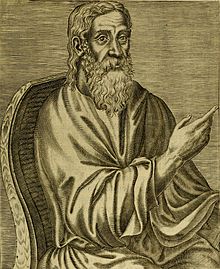Clement of Alexandria
Christian theologian (c.150 – c.215)
Titus Flavius Clemens (c. 150 – c. 215), known as Clement of Alexandria, was a Christian theologian who taught at the Catechetical School of Alexandria.


Quotes
edit- Our whole life can go on in observation of the laws of nature, if we gain dominion over our desires from the beginning and if we do not kill, by various means of a perverse art, the human offspring, born according to the designs of divine providence; for these women who, in order to hide their immorality, use abortive drugs which expel the child completely dead, abort at the same time their own human feelings.
- Paedagogus (The Instructor, c. 198 AD), 2.
- He alone can remit sins who is appointed our Master by the Father of all; He only is able to discern obedience from disobedience.
- Paedagogus (The Instructor, c. 198 AD), Book I, Ch. 8
- It is monstrous for one to live in luxury while many are in want.
- Paedagogus (The Instructor, c. 198 AD), Book II, Ch. 13
- There is one river of truth, which receives tributaries from every side.
- Stromata (Miscellanies, c. 198–203 AD), I: 5.
- Variant translation: There is one river of truth, but many streams fall into it on this side and that.
- We shall not err in alleging that all things necessary and profitable for life came to us from God, and that philosophy more especially was given to the Greeks, as a covenant peculiar to them, being, as it were, a stepping stone to the philosophy which is according to Christ.
- Stromata (Miscellanies, c. 198–203 AD), VI, 8.
- The purified righteous man has become a coin of the Lord, and has the impress of his King stamped upon him.
- Reported in Josiah Hotchkiss Gilbert, Dictionary of Burning Words of Brilliant Writers (1895), p. 104.
- How can it not be necessary, for him who wishes to lay hold of the power of God, to philosophise and to grasp with comprehension intellectual concepts?
- As reported in Clement of Alexandria by Eric Osborn (Cambridge University Press: 2008), p. 63.
Exhortation to the Heathen
editFull text online at earlychristianwritings.com
- To me, therefore, that Thracian Orpheus, that Theban, and that Methymnaean,--men, and yet unworthy of the name,--seem to have been deceivers, who, under the pretence of poetry corrupting human life, possessed by a spirit of artful sorcery for purposes of destruction, celebrating crimes in their orgies, and making human woes the materials of religious worship, were the first to entice men to idols; nay, to build up the stupidity of the nations with blocks of wood and stone,--that is, statues and images,--subjecting to the yoke of extremest bondage the truly noble freedom of those who lived as free citizens under heaven by their songs and incantations. But not such is my song, which has come to loose, and that speedily, the bitter bondage of tyrannizing demons; and leading us back to the mild and loving yoke of piety, recalls to heaven those that had been cast prostrate to the earth. It alone has tamed men, the most intractable of animals; the frivolous among them answering to the fowls of the air, deceivers to reptiles, the irascible to lions, the voluptuous to swine, the rapacious to wolves. The silly are stocks and stones, and still more senseless than stones is a man who is steeped in ignorance. As our witness, let us adduce the voice of prophecy accordant with truth, and bewailing those who are crushed in ignorance and folly: "For God is able of these stones to raise up children to Abraham;" and He, commiserating their great ignorance and hardness of heart who are petrified against the truth, has raised up a seed of piety, sensitive to virtue, of those stones--of the nations, that is, who trusted in stones. Again, therefore, some venomous and false hypocrites, who plotted against righteousness, he once called "a brood of vipers." But if one of those serpents even is willing to repent, and follows the Word, he becomes a man of God.
The Rich Man's Salvation
editLoeb Classical Library, Volume 92
- Οἱ μὲν τοὺς ἐγκωμιαστικοὺς λόγους τοῖς πλουσίοις δωροφοροῦντες ... ἀσεβεῖς μέν, ὅτι παρέντες αἰνεῖν καὶ δοξάζειν τὸν μόνον τέλειον καὶ ἀγαθὸν θεόν, ἐξ οὗ τὰ πάντα καὶ δι᾿ οὗ τὰ πάντα καὶ εἰς ὃν τὰ πάντα, περιάπτουσι τούτου τὸ γέρας ἀνθρώποις ἐν ἀσώτῳ καὶ βορβορώδει βίῳ κυλινδουμένοις καὶ τὸ κεφάλαιον ὑποκειμένοις τῇ κρίσει τοῦ θεοῦ.
- Men who offer laudatory speeches to the rich ... are impious, because, while neglecting to praise and glorify the only perfect and good God, from whom are all things and through whom are all things and to whom are all things, they invest with His prerogative men who are wallowing in a riotous and filthy life.
- p. 271.
- Men who offer laudatory speeches to the rich ... are impious, because, while neglecting to praise and glorify the only perfect and good God, from whom are all things and through whom are all things and to whom are all things, they invest with His prerogative men who are wallowing in a riotous and filthy life.
- Men who offer laudatory speeches to the rich ... are insidious because, although mere abundance is by itself quite enough to puff up the souls of its possessors, and to corrupt them, and to turn them aside from the way by which salvation can be reached, these men bring fresh delusion to the minds of the rich by exciting them with the pleasures that come from their immoderate praises, and by rendering them contemptuous of absolutely everything in the world except the wealth which is the cause of their being admired. In the words of the proverb, they carry fire to fire, when they shower pride upon pride, and heap on wealth, heavy by its own nature, the heavier burden of arrogance.
- p. 271.
- δεῖ δὲ σαφῶς εἰδότας ὡς οὐδὲν ἀνθρωπίνως ὁ σωτήρ, ἀλλὰ πάντα θείᾳ σοφίᾳ καὶ μυστικῇ διδάσκει τοὺς ἑαυτοῦ, μὴ σαρκίνως ἀκροᾶσθαι τῶν λεγομένων, ἀλλὰ τὸν ἐν αὐτοῖς κεκρυμμένον νοῦν μετὰ τῆς ἀξίας ζητήσεως καὶ συνέσεως ἐρευνᾶν καὶ καταμανθάνειν.
- The sayings ... which are of importance for the whole end of salvation, and are enveloped in a wonderful and super-celestial depth of thought, should not be taken as they strike the careless ear, but with an effort of mind to reach the very spirit of the Saviour.
- p. 283.
- For this is the true following of the Saviour, when we seek after His sinlessness and perfection, adorning and regulating the soul before Him as before a mirror and arranging it in every detail after His likeness.
- p. 315.
- If, for instance, a man had a godless father or son or brother, who became a hindrance to his faith and an obstacle to the life above, let him not live in fellowship or agreement with him, but let him dissolve the fleshly relationship on account of the spiritual antagonism.
- p. 317
- All possessions are by nature unrighteous when a man possesses them for personal advantage as being entirely his own, and does not bring them into the common stock for those in need.
- p. 337
To the Newly Baptized
editLoeb Classical Library, Volume 92
- Cultivate quietness in word, quietness in deed, likewise in speech and gait; and avoid impetuous eagerness, for then the mind will remain steady, and will not be agitated by your eagerness. ... For the mind, seated on high on a quiet throne looking intently towards God, must control the passions, ... so that your quietness may be adorned by good proportion and your bearing may appear something divine.
- p. 371.
- Take care never to speak what you have not weighed and pondered beforehand; nor interject your own words on the spur of the moment and in the midst of another’s; for you must listen and converse in turn, with set times for speech and for silence.
- p. 373.
- Let everything you do be done for God, both deeds and words; and refer all that is yours to Christ; and constantly turn your soul to God; and lean your thought on the power of Christ. ... Let Christ be to you continual and unceasing joy.
- pp. 373-374.